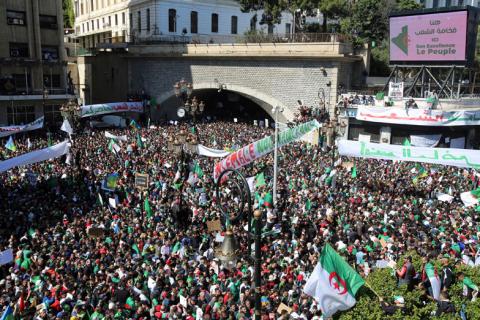Advertisement
Algeria protest leader vows more pressure despite Bouteflika decision
ALGIERS (Reuters) - Algerian President Abdelaziz Bouteflika's decision to quit by April 28 "will change nothing" and demonstrations will continue, a protest leader said on Tuesday, indicating popular pressure for more far-reaching political change remains insistent.
Mustapha Bouchachi, a lawyer and activist, was speaking to Reuters as hundreds of students marched in Algiers to demand the immediate resignation of Bouteflika and the replacement of a political system widely seen as incapable of significant reform.
On Monday, bowing to weeks of popular discontent including mass marches and rallies, the veteran ruler announced he would leave before his terms expires at the end of the month.
Bouchachi suggested Bouteflika's nomination of a caretaker government was a move to perpetuate the political system.
"Bouteflika's decision (to resign) will change nothing," Bouchachi said.
"What is important to us is that we do not accept the (new caretaker) government. Peaceful protests will continue."
His comments, and the peaceful students' march through central Algiers, indicate Bouteflika's move had not mollified all pressure for reform built up by weeks of demonstrations seeking an end to his 20-year-old rule.
"We want a regime change" and "We don't want Bouteflika or Said (his brother and presidential adviser)," the crowd chanted.
The Islamist opposition party, the Movement for the Society of Peace (MSP), also rejected Bouteflika's move, saying leaving without real reforms was a move to undermine the protesters' demands.
"This step is made to preserve the political system," the MSP said in a statement.
Protests have been driven by youth and lawyers demanding the removal of a ruling elite seen by many as out of touch with ordinary Algerians and unable to revive an economy riven by cronyism.
CARETAKER PRESIDENT
Bouteflika, 82 and in poor health, would take important decisions to ensure "continuity of the state's institutions" before stepping down, the presidency said in Monday's statement cited by state media. It did not elaborate.
Under Algeria's constitution, Abdelkader Bensalah, chairman of the upper house of parliament, would take over as caretaker president for 90 days until elections are held.
Bouteflika, rarely seen in public since he suffered a stroke in 2013, at first sought to defuse the unrest by saying on March 11 he was dropping plans to run for a fifth term.
But he gave no timetable for his exit, advocating a national conference on reforms to address the outpouring of discontent over corruption, nepotism, economic mismanagement and the protracted grip on power of veterans.
Bouteflika's hesitation further enraged protesters, spurring the army chief of staff to step in by proposing last week to implement a provision of the constitution under which a constitutional council would determine whether Bouteflika was still fit to govern or allow him to resign.
Most opposition parties have rejected a new caretaker government named by Bouteflika on Sunday because they see new Prime Minister Noureddine Bedoui as too close to the ruling elite, despite the inclusion of respected technocrats.
The government newspaper El Moudjahid said in an editorial Bouteflika's decision was a way forward. "It is clear that from now on this is the institutional roadmap which is needed as a constitutional...solution, it said.
(Writing by Ulf Laessing, Editing by Jon Boyle and William Maclean)



















Add new comment